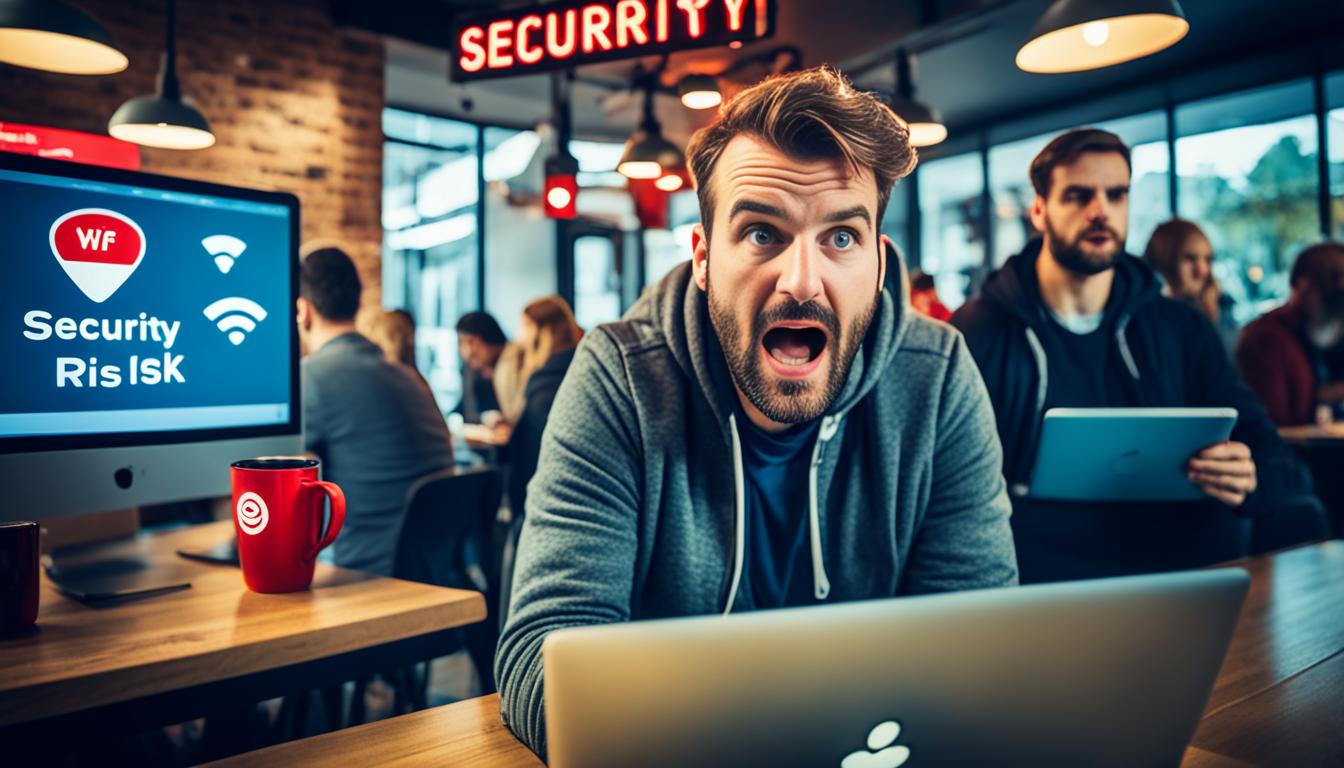You’re at the airport, waiting for your flight. You’ve arrived early and have a couple of hours to kill. What’s the first thing you do? You pull out your phone and connect to the free Wi-Fi network, right? After all, it’s convenient, it’s fast, and most importantly, it’s free! But did you know that this seemingly harmless act could be putting your personal information at risk?
Using public Wi-Fi networks, especially those that are unsecured, can expose you to a host of cybersecurity threats. Hackers can easily intercept your data and gain access to your personal information, such as passwords, banking details, and even your identity. It’s like leaving your front door wide open for anyone to walk in and help themselves to your most valuable possessions.
According to a recent study, a staggering 40% of people have had their information compromised while using public Wi-Fi. That’s almost half of all travelers who unknowingly put themselves at risk every time they connect to a public network. It’s time to take a closer look at the risks involved and how you can protect yourself.
Key Takeaways:
- Connecting to free public Wi-Fi networks can expose your personal information to cybersecurity threats.
- Hackers can intercept your data and gain access to sensitive information like passwords and banking details.
- A recent study found that 40% of people have had their information compromised while using public Wi-Fi.
- Understanding the risks and implementing cybersecurity measures is crucial for protecting your online security.
- Using a virtual private network (VPN) and practicing safe browsing habits can help mitigate the risks.
The Dangers of Using Public Wi-Fi
Public Wi-Fi networks may seem like a convenient way to stay connected on the go, but they come with serious security risks. When you connect to public Wi-Fi, you expose your personal information to potential cyber attacks, putting your sensitive data at risk. Let’s dive into the dangers of using public Wi-Fi and why you need to take precautions to protect yourself.
Public Wi-Fi networks are often unsecured, making them an easy target for hackers and cybercriminals. These individuals can intercept the data you send and receive over the network, including your passwords, banking details, and other personal information. It’s like sending a postcard with your private information for anyone to read.
The risks of using public Wi-Fi include:
- Identity theft: Hackers can steal your personal information and use it to impersonate you or commit fraudulent activities.
- Data breaches: Your sensitive data can be exposed in a data breach, leading to financial loss or reputational damage.
- Malware infections: Connecting to an unprotected Wi-Fi network can allow malware to enter your device, compromising its security.
Imagine enjoying your coffee at a local café while simultaneously exposing your personal information to potential cyber threats. Scary, isn’t it? Unfortunately, public Wi-Fi networks at cafes, hotels, airports, and other popular locations are prime hunting grounds for hackers.
To illustrate the potential consequences of using public Wi-Fi, consider this eye-opening statistic: a recent study found that 40% of respondents had their information compromised while using public Wi-Fi. This alarming number underscores the urgent need for caution and awareness when it comes to connecting to public networks.
So, what can you do to protect yourself from the dangers of public Wi-Fi? One effective measure is to use a virtual private network (VPN). A VPN encrypts your internet connection and acts as a secure tunnel, ensuring that your data remains private and inaccessible to hackers. It’s like having your own bodyguard when browsing the web on public Wi-Fi.
Additionally, always be cautious with the type of information you share while connected to public Wi-Fi. Avoid logging into sensitive accounts or making online transactions, as these activities put your personal information at a higher risk of being compromised. Use HTTPS-enabled websites whenever possible, as they provide an extra layer of security.
Remember, cyber attacks can happen to anyone, anywhere, at any time. By understanding the potential dangers of using public Wi-Fi and taking proactive measures to protect yourself, you can enjoy the convenience of staying connected without compromising your personal information or falling victim to cybercrime.
Safeguarding Your Data: Quick Tips
Here are some quick tips to help you stay safe while using public Wi-Fi:
- Use a VPN to encrypt your connection and keep your data private.
- Avoid accessing sensitive information or making financial transactions on public Wi-Fi.
- Be cautious of the websites you visit and only use HTTPS-enabled sites for added security.
- Keep your devices updated with the latest security patches and antivirus software.
- Consider using mobile data or a personal hotspot as a more secure alternative to public Wi-Fi.
| Public Wi-Fi Risks | Precautions |
|---|---|
| Identity theft | Use a VPN for encrypted connections and avoid sharing personal information. |
| Data breaches | Minimize your use of public Wi-Fi for sensitive activities and regularly monitor your accounts for suspicious activity. |
| Malware infections | Keep your devices updated, use robust antivirus software, and be cautious of downloading files or clicking on suspicious links. |
Where Public Wi-Fi Is Most Commonly Used
When it comes to accessing public Wi-Fi, it seems that everyone has their favorite spot. Whether you’re grabbing a coffee at a café, staying at a hotel, or studying at the library, these locations offer a convenient way to stay connected while on the go.
According to a recent survey, the most popular places for accessing public Wi-Fi include:
- Cafes and Restaurants (38% of respondents)
- Hotels (38% of respondents)
- Libraries (33% of respondents)
- Airports (25% of respondents)
- Retail stores (19% of respondents)
- Schools (15% of respondents)
These findings highlight the widespread usage of public Wi-Fi in various settings, demonstrating the need for quick and convenient internet access for both leisure and work-related activities.
So, the next time you find yourself in need of Wi-Fi, head to one of these popular locations and join the ranks of fellow internet enthusiasts. Just remember, while it may be tempting to connect to any available network, it’s essential to stay vigilant and take steps to protect your personal information.
Perception of Public Wi-Fi Safety
When it comes to public Wi-Fi safety, opinions are divided. According to a recent survey, only 23% of respondents believed that public Wi-Fi is safe, while 43% considered it somewhat safe. On the other hand, a small percentage of 5% believed it to be completely unsafe. This mixed perception highlights the concerns and uncertainty surrounding the security of public Wi-Fi networks.
One alarming finding from the survey was that 56% of respondents connected to public Wi-Fi networks that did not require a password. This lack of security measures exposes users to greater risks and increases the likelihood of personal information falling into the wrong hands.
Given these numbers, it is evident that there is a need for greater awareness and education regarding the potential security risks of public Wi-Fi. Users should be informed about the importance of implementing security measures such as using virtual private networks (VPNs) and creating strong passwords to protect their data.
The Importance of VPNs and Passwords
Using a VPN is one of the most effective ways to secure your connection when using public Wi-Fi. A VPN encrypts your internet traffic, making it difficult for hackers to intercept and access your sensitive information. It creates a secure tunnel between your device and the website or online service you’re accessing, protecting your data from prying eyes.
Similarly, using strong, unique passwords for all your online accounts is crucial. Weak passwords are like an open invitation for hackers to access your accounts and steal your personal information. By creating complex passwords that include a mix of uppercase and lowercase letters, numbers, and special characters, you significantly reduce the risk of unauthorized access.
“Connecting to public Wi-Fi without taking proper security precautions is like leaving the front door of your house wide open. You wouldn’t do that, right? So why take the risk with your online security?”
It’s essential to remember that perception doesn’t necessarily reflect reality. While public Wi-Fi networks may seem convenient and harmless, they can expose you to significant security risks. Taking steps to protect your data, such as using a VPN and strong passwords, is crucial to ensure your online safety.
| Perception of Public Wi-Fi Safety | Percentage of Respondents |
|---|---|
| Believed public Wi-Fi is safe | 23% |
| Considered public Wi-Fi somewhat safe | 43% |
| Believed public Wi-Fi is not safe at all | 5% |
| Connected to public Wi-Fi networks without passwords | 56% |
Risks of Using Public Wi-Fi While Traveling
When it comes to using public Wi-Fi, not all hotspots are created equal. While it may seem convenient to connect to the airport Wi-Fi or hotel Wi-Fi during your travels, it’s important to be aware of the potential risks involved. The survey conducted found that a significant percentage of respondents experienced data compromises while using public Wi-Fi in various travel locations.
A Snapshot of Travel Risks
Let’s take a closer look at the survey findings:
| Location | Data Compromises |
|---|---|
| Airport | 23% |
| Hotels | 20% |
| Cafes or Restaurants | 25% |
The table above illustrates the percentage of respondents who reported online security compromises while using public Wi-Fi in different travel locations. As you can see, the highest percentage of data compromises occurred at airports, followed closely by hotels and cafes or restaurants. This highlights the increased risk travelers face when relying on public Wi-Fi networks while on the go.
It’s important to remember that data compromises can lead to a variety of issues, including identity theft, unauthorized access to personal information, and financial losses. Therefore, taking precautions to protect your data is paramount when using public Wi-Fi during your travels.
But what exactly makes public Wi-Fi at these locations more vulnerable to data compromises? Let’s examine a few key factors:
“Traveling often puts individuals in a rush, making them more susceptible to hastily connecting to any available Wi-Fi network without considering the potential risks.” – Cybersecurity Expert
Understanding the Risks
Airport Wi-Fi, hotel Wi-Fi, and public Wi-Fi at cafes or restaurants are all popular targets for hackers due to the high volume of users and the potentially sensitive information being transmitted. These networks are often unsecured, making it easier for cyber attackers to intercept data and compromise your online security.
When you connect to public Wi-Fi, hackers can potentially gain access to personal information such as passwords, credit card details, and other sensitive data. This puts you at risk of identity theft, financial fraud, and other cybercrimes.
As illustrated above, the image depicts a traveler using public Wi-Fi at an airport, highlighting the specific keyword related to this section.
With the increased reliance on technology and the convenience of staying connected while traveling, it’s crucial to be aware of the risks and take necessary precautions to protect your data.
Protecting Your Data While Traveling
Here are some essential steps you can take to minimize the risks of using public Wi-Fi:
- Use a Virtual Private Network (VPN) to encrypt your internet connection and keep your data secure.
- Avoid accessing sensitive information or conducting financial transactions while connected to public Wi-Fi.
- Enable HTTPS on websites to ensure a secure connection.
- Update your devices regularly to protect against known security vulnerabilities.
- Turn off Wi-Fi when not in use to avoid automatically connecting to untrusted networks.
- Be cautious of suspicious Wi-Fi networks with names that resemble popular establishments.
By following these precautions and staying vigilant, you can better protect your personal information and reduce the risk of falling victim to data compromises while using public Wi-Fi during your travels.
Protecting Yourself on Public Wi-Fi
To ensure the safety of your personal information while using public Wi-Fi networks, it is essential to employ effective security measures. By following these tips, you can significantly reduce the risks associated with Wi-Fi usage:
- Use a reliable Virtual Private Network (VPN): A VPN creates a secure and encrypted connection between your device and the internet, preventing cybercriminals from intercepting your data. It acts as a protective shield, ensuring your online activities remain private and secure. Find a reputable VPN provider and enable it whenever you connect to public Wi-Fi.
- Enable HTTPS on websites: When browsing websites, look for the padlock icon in the address bar. It indicates that the website is transmitting data securely using HTTPS (Hypertext Transfer Protocol Secure). This encryption protocol adds an extra layer of protection to your data, making it harder for hackers to intercept.
- Avoid sharing settings: When connected to public Wi-Fi, refrain from sharing files or enabling sharing settings on your device. This prevents unauthorized users from gaining access to your device and potentially compromising your data.
- Turn off Wi-Fi when not in use: When you’re not actively using Wi-Fi, it’s best to turn it off. This simple step prevents your device from automatically connecting to insecure networks and reduces the chances of being targeted by hackers.
- Keep your devices updated: Regularly update your smartphone, tablet, or laptop with the latest security patches and software updates. These updates often include important fixes for vulnerabilities that could be exploited by cybercriminals.
Remember:
“Protecting your online security is not just about avoiding risks; it’s about actively implementing security measures to safeguard your personal information.”
By incorporating these precautions into your Wi-Fi usage routine, you can protect your personal information and enjoy the convenience of public Wi-Fi without compromising your security.
Importance of VPN and Education
Did you know that 40% of people use a VPN (Virtual Private Network) when connecting to public Wi-Fi? This statistic highlights the crucial role of VPN usage in securing personal data and protecting against potential cybersecurity threats.
However, despite the growing awareness of VPNs, there is still a significant portion of users who are unaware of the risks associated with using public Wi-Fi and do not utilize this vital security tool. This knowledge gap emphasizes the need for more education and awareness about network security and data protection when accessing public Wi-Fi.
By understanding the significance of VPNs, individuals can take proactive steps to safeguard their sensitive information, ensuring a more secure online experience. Let’s explore why VPN usage and cybersecurity education are essential in the era of digital connectivity.
The Power of VPN Usage
A VPN establishes a secure encrypted connection between your device and the internet, protecting your data from prying eyes. It acts as a shield, preventing potential hackers from intercepting sensitive information such as passwords, financial details, and personal data.
When you connect to public Wi-Fi without a VPN, your online activities are vulnerable to cyber threats, including data breaches, identity theft, and malware infections. By using a VPN, you can add an extra layer of security, minimizing the risks associated with accessing public networks.
The benefits of VPN usage extend beyond just your online security. A VPN also allows you to bypass geo-restrictions and access content that may be restricted in your region. Whether it’s streaming your favorite shows or accessing websites while traveling, a VPN offers a seamless browsing experience while keeping your data safe.
The Need for Cybersecurity Education
While VPNs are a powerful tool for network security, it is equally important to educate users about the risks inherent in using public Wi-Fi networks. Many people are unaware of the potential dangers and unknowingly put their personal information at risk.
Cybersecurity education plays a vital role in fostering a safer digital environment. By increasing awareness of the risks and best practices for protecting data, individuals can make informed decisions about their online security. Understanding how to identify secure networks, implement strong passwords, and enable encryption are essential skills for safeguarding personal information.
Moreover, cybersecurity education should be an ongoing process. As technology evolves and cyber threats become more sophisticated, staying informed about the latest trends and security measures is crucial. By prioritizing cybersecurity education, we can empower individuals to take control of their online safety.
“Cybersecurity education is the key to a safer digital world. By equipping yourself with knowledge and utilizing essential tools like VPNs, you can protect your data and stay one step ahead of cyber threats.”
To illustrate the importance of VPN usage and education, consider the following table:
| VPN Usage | Cybersecurity Education |
|---|---|
| Enhances network security | Raises awareness of potential risks |
| Protects sensitive data | Teaches best practices for data protection |
| Bypasses geo-restrictions | Empowers individuals to make informed decisions |
| Minimizes cybersecurity threats | Fosters a safer digital environment |
As you can see, VPN usage and cybersecurity education go hand in hand, providing individuals with the necessary tools and knowledge to protect their online presence effectively.
By embracing VPNs and investing in cybersecurity education, we can collectively work towards a more secure digital landscape, ensuring our data protection and network security.
Conclusion
So, you’ve learned about the risks associated with public Wi-Fi and the importance of data protection in the digital age. While free Wi-Fi may seem tempting, it can leave your personal information vulnerable to cyber threats. But fear not! There are cybersecurity measures you can take to safeguard your data and privacy.
One of the most effective ways to protect yourself is by using a VPN (Virtual Private Network). A VPN encrypts your internet connection, making it virtually impossible for hackers to intercept your data. With VPN encryption, you can browse the web securely and access public Wi-Fi without worrying about potential risks.
But VPNs are just one piece of the puzzle. It’s also crucial to practice safe browsing habits. Be cautious when sharing personal information online and avoid clicking on suspicious links or downloading unknown files. By being mindful of your online behavior, you can reduce the chances of falling victim to cyber attacks.
Remember, knowledge is power. Stay informed about the latest cybersecurity threats and best practices. By taking proactive measures and staying vigilant, you can enjoy the convenience of public Wi-Fi while maintaining your privacy and data protection. So go forth, browse freely, and keep your personal information safe!










